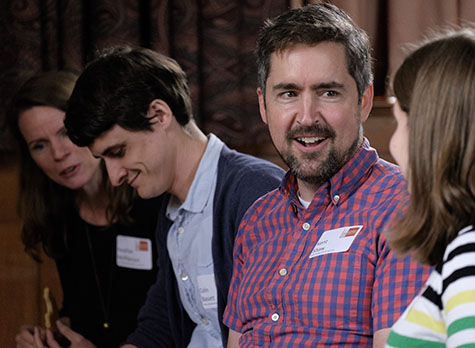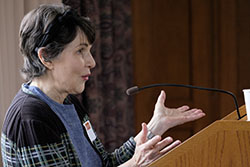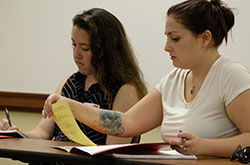
For 20 summers now, students of all ages and from all walks of life have gathered on the campus of Washington University in St. Louis to write, read, write, read and write some more.
The Summer Writers Institute, an intensive, two-week writing seminar, is thriving after two decades. What began in 1996 in an effort to build community among regional writers has evolved into a creative force of energy that enables entry into both the St. Louis writing community and the rich literary tradition of Washington University.
Part summer camp, part MFA-level instruction, participants come away with a kick-start to their writing careers and more than a few industry truths, among them seeing their writing as craft; learning that “workshop” is an active verb; and inviting feedback as not only necessary but welcome.
“It’s wonderful, two-week energy,” said Kathleen Finneran, writer-in-residence in Arts & Sciences at Washington University and an instructor in the program for eight of the last 10 summers.
Indeed it is. That energy is igniting again July 10-24, when the Summer School program in University College holds the 20th annual Summer Writers Institute. Events kick off Friday, July 10, with a keynote address by poet Mary Jo Bang, professor of English in Arts & Sciences, one of the most acclaimed poets of the 21st century.

After the address, participants break into one of eight seminars taught by university faculty and other published authors and spend the next two weeks of alternate evenings and weekends in small groups honing their craft. They regroup for a series of craft talks on the weekends, learning the nuts and bolts of the industry from instructors who have sweated out their own published work on their own keyboards. Among the faculty this year are Colin Bassett, Stefan Merrill Block, Richard Chapman, Finneran, Heather McPherson, David Schuman, Kent Shaw and Deborah Taffa.
New to the institute are expanded course offerings – two sections of creative nonfiction, divided into literary journalism and the personal narrative; modern humor; and screenplay writing to go along with fiction, flash fiction and poetry. In addition, the first “Summer in St. Louis Writing Contest” was held this year, with Francis Oates chosen as the winner for the entry “Growing Space.”
“It’s really difficult to make art in a vacuum,” said Schuman, director of Washington University’s Master of Fine Arts (MFA) program in Arts & Sciences and instructor this year of flash fiction. “That experience of writing alone, up in your bedroom at night, or at your kitchen table while your kids are running around can be really isolating.
“The institute allows writers to feel as if they’re part of a community — and the conversation within that community with both the instructors and the students. It informs and enhances the work that these writers are doing, so that they return to their practice more informed with the work of a larger literary world.”
The early days
That’s exactly what the founders were hoping for when the institute was founded in the summer of 1996.
“The impulse to set up the Summer Writers Institute came from a perceived need that we have a community of writers in St. Louis who were interested in taking the time to dive into their craft, share their work and grow,” said Doreen Salli, director of the College Writing Program, professor of practice in Arts & Sciences and the founding director of the institute.
“It was immediately evident that people loved it,” she said. “They came onto the campus, which is gorgeous in the summer, and they loved being here. They brought their creativity and their excitement about the craft, and they created a community that was invested in this process of writing and revising their work. It was so much fun.”
It’s that enthusiasm from both instructors and participants that has contributed to its longevity. The format has evolved from a two-week day course to a weekends-evenings session that allows the students to work a day job and then come onto campus in their off-hours and commit to writing.

“It feels like a two-week ‘event,’ ” Schuman said. “The intensity of the course is turned up a notch because it’s at night and on weekends. When you draw people who have been working all day, it sort of weeds out those who aren’t going to be as devoted. You’ve got to be willing to take on the challenge, and these students truly are.”
Students do come from all walks of life and disciplines, which enhances the experience in the small-group workshops. Most of the participants are from the St. Louis area, but they have come from all over the world.
University staff members from all levels have, at times, participated alongside notable university professors such as Henry Schvey, PhD, professor of drama in the Performing Arts Department and of comparative literature in Arts & Sciences; and Nancy Berg, PhD, professor of Hebrew languages and literatures in Arts & Sciences.
“I had a wonderful experience and have recommended the institute to friends and colleagues,” Berg said. “I continue to benefit from the workshop in both my writing and teaching.”
Sometimes, there’s that spark that gets ignited in the students to take the experience and move beyond the summer. Last year at this time, Jen Meyer, assistant director of career development for art in the university’s Career Center, was anticipating the institute to stretch herself a bit in Schuman’s flash-fiction course. This year, she’s in Vermont participating in the first phase of a low-residency MFA program through Bennington College.
“Because of Summer Writers, and then with David (Schuman’s) encouragement and help with my MFA application, I now have a focus and the courage to move on,” she said.
There’s that faculty again — the backbone of the institute and arguably one of the strongest in the Midwest for a writer’s workshop. Finneran, who wrote the memoir “The Tender Land” in 2000, admits she’s always a bit anxious at the start over whether the class will get enough accomplished in the two-week time period.
“I don’t know why, because every year we get an abundance of stuff done,” she said. “I am completely surprised by how much work the students accomplish in a compressed amount of time.”
For more information on this year’s Summer Writers Institute, visit summerschool.wustl.edu/swi or call 314-935-4695.
“I think one of the best things the institute does is enlarge our scope to the St. Louis community in terms of taking classes in a way that’s not possible in the traditional school,” Finneran said. “That is its greatest value. There is a lot of visibility to the literary community of WashU, but the access is rather limited.
“The Summer Writers Institute is that moment of access that really enlarges the community of writers in St. Louis,” she said.